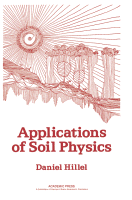Browse content
Table of contents
Actions for selected chapters
- Full text access
- Book chapterNo access
1 - Soil Physics Explores the Hidden Turmoil in the Field
Pages 1-2 - Book chapterNo access
Bibliography
Pages 357-376 - Book chapterNo access
Index
Pages 377-385
About the book
Description
Applications of Soil Physics deals with the applications of soil physics and covers topics ranging from infiltration and surface runoff to groundwater drainage, evaporation from bare-surface soils, and uptake of soil moisture by plants. Water balance and energy balance in the field are also discussed, along with tillage and soil structure management. The development and extension of Penman's evaporation formula is also described. This book is comprised of 14 chapters and begins with a systematic description of the field-water cycle and its management, with emphasis on infiltration and runoff; redistribution and drainage; evaporation and transpiration; and irrigation and tillage. Subsequent chapters focus on transpiration from plant canopies; freezing phenomena in soils; scaling and similitude of soil-water phenomena; spatial variability of soil physical properties; and movement of solutes during infiltration into homogeneous soil. Concepts of soil-water availability to plants are considered, together with principles of irrigation management and the advantages and limitations of drip irrigation. This monograph is intended for upper-level undergraduate and graduate students of the environmental, engineering, and agronomic sciences.
Applications of Soil Physics deals with the applications of soil physics and covers topics ranging from infiltration and surface runoff to groundwater drainage, evaporation from bare-surface soils, and uptake of soil moisture by plants. Water balance and energy balance in the field are also discussed, along with tillage and soil structure management. The development and extension of Penman's evaporation formula is also described. This book is comprised of 14 chapters and begins with a systematic description of the field-water cycle and its management, with emphasis on infiltration and runoff; redistribution and drainage; evaporation and transpiration; and irrigation and tillage. Subsequent chapters focus on transpiration from plant canopies; freezing phenomena in soils; scaling and similitude of soil-water phenomena; spatial variability of soil physical properties; and movement of solutes during infiltration into homogeneous soil. Concepts of soil-water availability to plants are considered, together with principles of irrigation management and the advantages and limitations of drip irrigation. This monograph is intended for upper-level undergraduate and graduate students of the environmental, engineering, and agronomic sciences.
Details
ISBN
978-0-12-348580-9
Language
English
Published
1980
Copyright
Copyright © 1980 Elsevier Inc. All rights reserved.
Imprint
Academic Press
